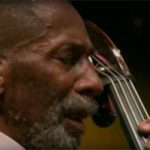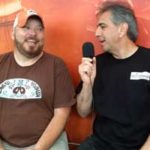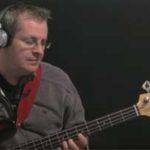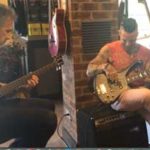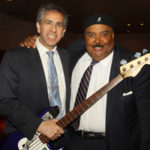Long-time bassist with Paul Revere & the Raiders talks about the gigs, equipment and personal projects. Wait till you read what happened during one gig in Michigan!
Exclusive interview with FBPO’s Jon Liebman
May 3, 2010
Born and raised in Seattle, Washington, Ron Foos has been playing bass with Paul Revere & the Raiders for over 35 years. He has also toured and recorded with Randy Bachman, the Righteous Brothers, Bill Medley, the Beach Boys, Stevie Wonder, Kenny G, Albert Collins and many other musical stars.
In addition to being a first-rate bass player, Ron is also an award-winning songwriter, musician and producer. He has done work for the Make A Wish and Bridge the Gap Foundations, as well as various music projects, books and CDs for children’s organizations. His record company, RocknRollRecords.com, due to launch later this year, will feature music from rock artists worldwide. When Ron isn’t on the road with Paul Revere or Bill Medley, he can often be found in his home studio, writing and producing songs.
FBPO: Tell me about your musical upbringing. How did you end up as a bass player?
RF: I was brought up in the early ’50s, with two older and much bigger brothers, so when we wanted to start a little ’50s teen rock band, one brother wanted to play drums and the other brother wanted to play guitar. Since I enjoyed staying alive, I took the job as the bass player. I’ve always loved the drums and probably would have played those had I not been “commissioned” into playing the bass. For a long time, I played guitar for a living and, in my early years, even played a couple of paying jobs on drums. In the last ten years or so, I have really fallen in love with the piano as a favorite too. But bass has always remained my true love.
I think most bass players would agree that the more knowledge you have about all music and instruments – chords, inversions, counterpoint, harmony, arranging, writing and music theory – the greater advantage you’ll have as a bass player. It all helps when it comes to knowing what to play and what not to play, as well as “what, when and where” to play! After turning 60 years old this past Christmas Day 2009 and, having started on bass at around 14, I am still obsessed with learning the “where, when and what” to play. Though it is such an underrated art form itself, it may be the most important key to bass playing a person could learn. Chops are great, but if you can’t feel where to put them, then you’re just another bass player with big chops. I have such respect for the bass player that lays it down, does his job and just naturally knows the big three of “what, where and when” to play. If you listen to guys like Nathan East, Paul McCartney, Chuck Rainey, James Jamerson, Ray Brown and all the other bass greats, they will show you the way. But you have to listen!
FBPO: Was there a turning point that made you realize you’d established your position as a professional musician?
RF: YES! I remember it well. It was 1968. I was a senior in Mountlake Terrace High School, playing bass in my own rock dance band, called The Pied Pipers. We copied bands like The Rolling Stones, The Beatles, The Hollies, Joe Cocker and The Raiders – straight rock and roll. I had an offer to play lead guitar for a Seattle band called The City Zu. I was not comfortable with that, as I had put all my energy into becoming a decent bass player. I turned it down at first, until the band’s manager, Mr. Mac Keith, who also happened to be a friend of mine, said The City Zu had been signed to Columbia Records and had a big local hit with a song called “Give A Little Bit” on the radio. He also said we’d be opening for every big name concert act that came to the Seattle/Portland area and that I’d be making “X” dollars every week. I said “Where do I sign?!”
My good friend Doug Heath was the guitar player for CZ at the time, but needed some time away to regroup, as he thought he was going to be visiting Viet Nam for an unwelcome vacation. Before Doug left, I soaked up his teachings like a young sponge and learned a lot about guitar from him. Doug is still one of the best all ’round guitar players in the business and remains my good friend today. In fact, we are still playing together today after 40+ years now. That whole wonderful experience changed my life in ways I’d never thought possible.
FBPO: What exactly happened on that rainy Seattle morning all those years ago when Paul Revere called you? How did that all come about?
RF: Well, I hope I keep this timeline straight. At that time, Doug Heath had been playing guitar with “Angel of the Morning” hit maker Merilee Rush from Seattle. Paul Revere’s guitar player, Freddy Weller, had a hit called “Games People Play” and needed his time away from The Raiders to pursue his career. Paul called Merilee and asked if she knew of any guitar players who could replace Freddy in Paul Revere & the Raiders. Reluctantly, Marilee said Doug would be great and gave Paul that contact, which worked out great.
Doug kept telling me back then that Raider bass player Keith Allison had some big things going on and there may a chance that Paul Revere could use me in The Raiders sometime down the road. Time rolled by and I kept playing with The City Zu, making a decent living around the Seattle area, playing all the big rooms. By now, I was back playing bass and singing quite a bit as one of the three singers. It was a great band, if I can say that, and I was very proud to be in it.
I had forgotten all about the chance of being in Paul Revere & The Raiders until one rainy Seattle morning, probably around 7:30, when my phone rang. On the other end was someone claiming to be Paul Revere, saying he wanted to have lunch and talk to me. I almost hung up, thinking it was a prank caller or one of the guys in the band who hadn’t been to bed yet! Well, as the story goes, I took a chance, got up, took a shower and met Paul Revere for lunch on the waterfront that afternoon. He offered me the job as The Raiders’ bass player that day. I was flattered, but reluctant to leave my security, my band and my home. But then Paul said I’ll start you at “X” amount for your pay. Again I said, “May I borrow your pen?” and “Where do I sign!? “
As a Raider, I’m the luckiest guy to have had such a chance to play with great people and see places all over the world that I would have never had the chance to see. It is a pleasure to be playing with Paul Revere & The Raiders for almost all of my adult life.
FBPO: Was there an audition or some other event where you had to prove yourself as a musician and a bass player? What made Paul Revere decide to hire you as his long-term, permanent bass player?
RF: Paul Revere is like no other person you have ever met. I mean that with great respect. Paul has a talented eye and ear for what he wants in a musician. He was such a gentleman. He flew to Seattle without my knowledge and politely sat in the back of the showroom where I was playing. No one knew he was there. He stayed for a couple of sets and made his choice that evening, from what I understand. I never even knew he was there. I think I may have had a little history of being a respected bass player and reliable person around the Seattle area, which may have helped some. And being good friends with his guitar player may have had something to do with it too! Thank you, Doug Heath, for believing in me enough to pass the word onto Paul when the time was right.
My advice to any young musician: Practice hard, be on time, carry a good attitude and never burn your bridges with anyone. Ever. [Editor’s note: This advice is applicable to not-so-young musicians, as well.]
FBPO: What kind of crowds come out to hear Paul Revere? Is it pretty much the folks who grew up listening to the band back in the ’60s, or do you see a lot of newer generation people too?
RF: It is a real eye opener to see not only the longtime Raider music fans and friends over and over through the years, but the younger people, and even their kids, having a great time at the Raider shows. Paul Revere, now 72, is one of the “funnest” guys I know. I can play his show for 35+ years and not get tired of it. Other musicians ask me how I like playing with Paul Revere and if it ever gets old. My true answer is “No, not at all.” People come back again and again to see Paul Revere doing something fun and crazy. I think he invented rock and roll insanity.
The Raiders all love trying to just hang on and keep up, no lie there. We have a blast at work, and there is an unspoken level of high energy and brotherhood that brings a concert feel to every show we do. Ain’t nobody sleeping up on Paul Revere’s stage – or in the audience! When it’s rehearsal time, we take the music and keeping the classic tradition alive very seriously. We don’t try to be something we are not.
We have recorded CDs, DVDs, toured the world playing for our U.S. troops, performed on TV, radio and live. It’s fun being a Raider. People walk away from our shows saying, “This was one of the best and most fun shows I’ve ever seen!” I’m very lucky and proud to be a part of all that.
FBPO: After doing the same gig for over 35 years, you must have a good story or two to share with our readers. What stands out as being particularly significant or memorable?
RF: Hmm…which one? That is the real question! I’d say when asked this question, we all agree that playing a show in West Branch, Michigan, years ago was probably the strangest gig we had ever played. As it turns out, Paul Revere accepted a gig out in the middle of nowhere – no offense, West Branch, Michigan – and told us we had to stay out of town because the small city of West Branch had sold out its limited hotel rooms. We all found that to be a little strange, but accepted it for what it was. The Raiders all flew in as usual, but I noticed Paul carrying his little handy-cam with him the day of the show. Not real unusual and still no big deal. We pull up behind the stage in a van like any other show, we go eat in the hospitality tents and then start to go to the back of the outdoor stage, which was set up in a huge field, sort of like Woodstock. We could hear a huge crowd as we approached the stage pre-show to see what lights and sound we have to work with. Again Paul was there with the handy-cam.
We are all standing there looking away from the crowd, facing the stage. I saw Paul Revere standing in the shadows, smiling, filming us all from the side. As we turned our heads to look at the audience he kept filming to see our faces as we now were facing … a sea of naked people, ready to rock and roll in this huge field! He got it all on film. That’s Paul Revere for ya! What a concert, playing to completely naked people having a lot of fun dancing to the Raiders music. Best I stop there!
FBPO: What kind of equipment do you use?
RF: Let me start with a personal note. My bass mentor and best friend, Mike Cox, always used a 1959 Fender bass. He said it is a must for every working bass player to own one. I keep mine in the studio and would like to dedicate this entire interview to him. Rest in peace, my friend.
For Paul Revere & The Raiders, I use a custom-made Mike Lull 1965 Vox-style remake 5-string bass. It is a copy of the teardrop-shaped guitars and basses made famous in the ’60s. The Raiders and The Rolling stones used them. By the way, The Rolling Stones were Paul Revere and The Raiders’ opening act back then!
And because of the not-so-comfortable, off-balance design of the original 1960s Vox configuration, I had a balance bar installed to counter balance the weight of the bass. It’s like a shoulder strap horn with strap-locks. Paul Revere calls it a beer can opener! There are no active pre-amps, no extra tone knobs, EQs or pickup splitters on the bass, just one volume knob coming straight off the Bartolinipickups. I am always searching for that perfect, clean, natural bass tone that can get a little dirty when you make it work, but sounds clean when you play it nice. This bass has it all.
For funk, speed and pop playing, I use a 1985 Fender-style Washburn 4-string with two soap bar active Alembic pickups. For light jazz, pop and R&B, I use a 1999 Yamaha TRB 5-string bass.
My newest find is a 5-string CORT brand bass. I bought it when my Mike Lull bass was temporarily lost by the airlines and I was going onstage with The Raiders in one hour! I bought it “somewhere in Minnesota” for – are you ready? – $100.00 with a case! The music store – I wish I could thank them – put my Dean Markley strings on, wiped off the dust and tuned it and I played it for the Raider show that night! It has been my favorite back-up bass ever since! It’s a simple, well-balanced bass with good solid tone.
I use my standup bass probably the least. It is a good bass for under $1,000. No brand. But I did have it gone through, changed the strings, bridge, etc. It’s great fun to play!
My favorite strings for all basses are DEAN MARKLEY SR 2000 (exposed core) medium-light gauge bass strings. They are the best! For my onstage monitor bass rig, I like to use the SWR Big Ben series for clear tones from the lows off that B string. I added the SWR 4×10 cabinet on top for the punchy mid-range and passive adjustable horn – sweet!
As for power amps, do they make anything better than Crown power? Not in my humble opinion! My second choice is the Ampeg SVT workhorse, followed by a standard Gallien-Krueger 800 bi-amped series power amp. I use a Monster cable on everything. It is simply the best cabling out there and has a great warranty. I love Ultimate Ear in-ear monitors, too.
FBPO: What have you got going on musically outside of the Paul Revere gig?
RF: I have been writing my own music for years and have been privileged to work with some rock & roll greats, including Randy Bachman, Bill Medley and many, many others. I had a project a while ago that was a real challenge, but turned out to be a good learning tool. My friend and co-music manager, Steve Mueller, had an idea of making music for kids from 5 – 12 years old that would have simple, good clean lyrics, but with dance beats a young couple would enjoy, too. I know Barney is a great friend to many kids, but we wanted to create a style of music that both the kids and parents would enjoy together. It was a real learning experience for me. I must have written a whole CD’s worth of songs for it. A lot of other people have done the same thing since. McDonald’s provides music CDs with the Happy Meals, for example.
We are now looking at writing more music for a possible new cartoon show – more on that soon. I have also written songs for various non-profit organizations, including the Make A Wish Foundation and the Bridge the Gap National theme song. I’m also working with other non-profit groups to donate music to help needy children.
I am currently producing and writing my own music and working with various songwriters and singers locally. Michael Kasparian, an Orange County, California, school teacher/drummer/songwriter and I have been in Las Vegas at Steven Swinford’s studio, working on his dream songs. I’ve also been doing a lot of work in my home Logic Pro studio, working on the opening cut for a movie score called “Rock and Roll – The Movie” soon to be released. Other than that, I will say again, I am a lucky guy. I have been married to a great girl for over 20 years and have the best job I can think of.
FBPO: What do you like to do that’s not necessarily musically oriented?
RF: I love animals, Nevada sunsets, riding my bicycle, hiking, swimming and going to the gym. Even though I travel for my job, I still love seeing the world. My wife loves to travel too, and we have done a bit of exploring the world together, like hiking in Utah, walking all over Paris, taking the train over the Swiss Alps to Italy and seeing much of beautiful America too. Between the two of us, we have covered a lot of the continents and countries all over the world. She is a great travel partner and she is my personal rock of life. I am one very happy guy.

